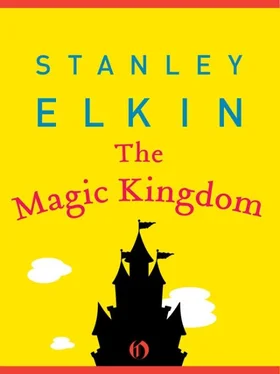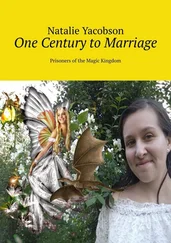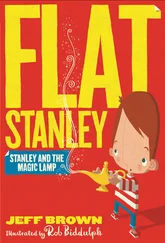Stanley Elkin - The Magic Kingdom
Здесь есть возможность читать онлайн «Stanley Elkin - The Magic Kingdom» весь текст электронной книги совершенно бесплатно (целиком полную версию без сокращений). В некоторых случаях можно слушать аудио, скачать через торрент в формате fb2 и присутствует краткое содержание. Год выпуска: 2010, Издательство: Open Road Integrated Media LLC, Жанр: Современная проза, на английском языке. Описание произведения, (предисловие) а так же отзывы посетителей доступны на портале библиотеки ЛибКат.
- Название:The Magic Kingdom
- Автор:
- Издательство:Open Road Integrated Media LLC
- Жанр:
- Год:2010
- ISBN:нет данных
- Рейтинг книги:5 / 5. Голосов: 1
-
Избранное:Добавить в избранное
- Отзывы:
-
Ваша оценка:
- 100
- 1
- 2
- 3
- 4
- 5
The Magic Kingdom: краткое содержание, описание и аннотация
Предлагаем к чтению аннотацию, описание, краткое содержание или предисловие (зависит от того, что написал сам автор книги «The Magic Kingdom»). Если вы не нашли необходимую информацию о книге — напишите в комментариях, мы постараемся отыскать её.
The Magic Kingdom — читать онлайн бесплатно полную книгу (весь текст) целиком
Ниже представлен текст книги, разбитый по страницам. Система сохранения места последней прочитанной страницы, позволяет с удобством читать онлайн бесплатно книгу «The Magic Kingdom», без необходимости каждый раз заново искать на чём Вы остановились. Поставьте закладку, и сможете в любой момент перейти на страницу, на которой закончили чтение.
Интервал:
Закладка:
“You don’t think I remember that?”
“I’ve hurt your feelings.”
“Nonsense.”
“I’ve hurt your feelings. It was all right to call Liam by his first name. He was my patient but he was a kid. It’s just not on to go all intimate with a patient’s family. You can ask Mister Moorhead regarding the ethicals of all this.”
“Mary Cottle calls me Eddy.”
“If Liam had lived it’d be a different story.”
“Oh? Yes?”
“If Liam had lived, you, me, and your missus could have gone off to the boozer, bought pints all around, tossed darts into the cork, and toasted one another’s health. It’d’ve been, ‘Here’s to your health, Colin.’ And turn and turn about I’d have picked up my mug and replied, ‘And ’ere’s to your own, Eddy!’ And Liam’s, of course. And Ginny’s — Mrs. Bale as was. If Liam had lived.”
“We could have been mates? If Liam had lived?”
“We’d have come through something important, don’t you see.
“And of course, if Liam had lived, you’d have had no reason to keep your distance.”
“I don’t think of it as a question of distance, Mister Bale.”
“Don’t you? You know, Colin, I was rather surprised you let me recruit you on this enterprise. I should have thought you could have made more money if you’d stayed on in England.”
“I’m paid well enough. Higher than regular.”
“Still,” Eddy said.
“What, didn’t you know that?”
“Higher than higher than regular,” Eddy said.
“Anyways, I wouldn’t want you to think I’m here for the money. These kids, these kids are condemned and convicted. They’ve been found guilty. Mister Bale. They’ve been put on the index. There’s a price on their heads. I’m a nurse. It’s my professional duty. Still, if my friend hadn’t given his blessing I shouldn’t have come.”
“Yes,” Eddy said, “it’s your ‘friend’ we’ve been talking about.”
Which was when Eddy thought the now flushed, embarrassed, and unforgiven man seemed to lose his temper. Colin glared at him and Bale thought, Won’t call me Eddy but’d strangle me easily enough. Though when he spoke, Colin’s voice was meek, the put-upon tones of patient, humbled injury muffling it like carpet, heavy drapes. “I’m not aware,” he said, “that we’ve ever discussed my friend, Mister Bale.”
“Liam brought him up,” Bale said.
“Liam? Liam did?”
“Oh, please,” Eddy said, “I saw you hugging at Heathrow. I know all about it. How you promised my son he’d go into the waxworks when he died.”
“I was cheering him up.”
“Liam didn’t believe you were cheering him up. Liam thought you meant every word. He believed it on his deathbed.”
“He didn’t seem a religious boy, our Liam. I was sounding him out like, Mister Bale. He seemed to take to the notion, so I encouraged him to believe I could arrange it.”
“What? To think he could be turned into some great wickless candle?”
“ Can dle? Can dle? We’re talking about art, Mister Bale. That’s art what my friend does.”
“Oh, your friend again! That gave you his blessing. That told you, ‘Certainly, Colin. Go for it, darling. Take the Brownie along, why don’t you? Maybe we can get all of them in the picture.’”
“We could!” Colin snapped. “We never discussed it but we could! No one stands in the way of art. Oh, I don’t say what you’re doing isn’t well meant, even heroic in some proper charlie sort of way, but if it’s all to end up in the boneyard what difference does it make?”
“It calls attention.”
“And wax doesn’t? Wax doesn’t call attention?”
“That’s ridiculous.”
“Why’d you hire me? Why’d you hire me then, you think I’m so bloody ridiculous?”
“Because mugs have no control,” Bale said calmly. “Because sooner or later they get in over their heads. They become outrageous.”
“Outrageous?”
“Outrageous. Oh, yes. Because sooner or later they’re thinking Great Train Robbery. They’re dreaming about tunneling under Lloyd’s. They have Old Lady of Threadneedle Street schemes and hold opinions about Richard III, the babes in the Tower.”
“You’ve been to the Madame’s then?”
“They’re thinking Madame Tussaud’s! Oh, yes, outrageous. Some dreadful crèche of the infant dead. Because I thought you might pull something like this, that’s why. That if you had enough rope…You never gave a thought to bad taste, did you? Or turned your mind to public opinion, invasion of privacy, the terrible consequences of going too far?”
“Not a bit of it,” Colin Bible said. “Just as you never thought about what it means to be dead.”
“What? What does it mean, Colin?”
“It means you’ve no longer any say in the matter,” Colin Bible said. “According to my friend, who happens to be an expert in this particular area, it means public domain, Mister Bale.”
“Eddy,” Eddy Bale said.
Who was astonished but not displeased to be speaking as he’d meant to speak back in England, warning them away from their private fiddles, his quiet caper heart at last unburdened. Sorry only that it had to be Colin Bible, whom he liked and trusted more than the others, who took the brunt of his wild charges. Seeing he had set a fire under the man.
Then I am mad, he thought sadly.
Colin certainly was. Furious. All he’d meant was to take Bale aside and cite the woman’s dereliction. Getting separated like that was unforgivable. He wanted it on the record. Now he couldn’t remember whether they’d even spoken of it. And he was fond of Eddy. How had they gotten into such a foofaraw? However, they were in it. The man had implied just awful things about his friend. Poor Colin, Colin thought. And not without a blast of the same shame, stricken, embarrassed for his fuddy- duddy technology, he’d felt earlier that day in the Hall of Presidents when Lincoln had begun to speak. And felt again, only this time with the full force of an idea which earlier had been only the vaguest of notions and was to its implications and consequences what loose change in one’s pocket might be to an idea of money, say. Now it was almost fully formed, beginning to take shape even as he’d tried to deflect Bale’s wild charges, and still firming up, though what he was going to do already clear enough for him to begin to take the first dreadful steps.
Because she shared a room with them, Nedra Carp was partial to Lydia Conscience and Rena Morgan. If this was unfair to the rest of the children, if it excluded the boys or put a distance between Janet Order and herself, why, then, it couldn’t be helped. It would have been a defiance of her nanny heart otherwise. A nanny — she could not, in conscience, endorse the justice of this, only vouch for it; it seemed an instinct, almost a condition, some less-than-neutral magnetism of the blood that drew her loyalties and turned her into some patriot of the propinquitous that carried with it all the convenient obligations of hired-hand love — she felt herself constitutionally unable (and disinclined, too) not so much of assuming responsibility — she was responsible by nature and would probably have put herself at risk without a second thought, throwing herself into burning buildings and heavy seas, though she feared fire above all else and was not a strong swimmer, if a young life were at stake — for the welfare of children not in her charge, as unable to work up any affection that had not actually been bought and paid for. It was a flaw in her character. She understood and even chided herself for this. She even tried to be better but knew she was incapable of an unauthorized love. What bothered her even more were her aversions, her view of other children, even these children — the boys, Janet Order — as threats and rivals, something “other” in them that put her off and made her uneasy, queasy, squeamish: rather, she thought, like some hungry, willful orthodox offered proscribed food. Objectively, she disapproved of this aspect of her character. She was nothing if not objective, professional objectivity being her strong suit, her stock in trade, and was prepared not only to do the fair thing but to perceive it, which was not always easy (turns, for example; not whose turn, necessarily, which was usually only a matter of simple reckoning, but the quality of a turn, too, its special boons or built-in deficiencies: if the wind was down and refused the kite, if the one pushing the swing was a slacker, if a child didn’t fully understand the terms of a game; or trades: whether fraud was intended, whether a toy was damaged by abuse, accident, or through some basic defect in its construction; settling all manner of arguments and disputes right down to the thorny question of taste itself: what to do, for instance, if only yellow balloons remained to be distributed; who should get the caramel, who must take the toffee) and was, because she dealt with children who didn’t have her fine perceptions and sensibilities and were without skill in weighing evidence or making her surgical distinctions, who had, in fact, nothing but their own supercharged egos to judge by and go on, and whose blind, barbaric self-interest lived in them like a weight in dice and was sometimes, even for Nedra, impossible, a judgment call. And not just her aversion to children who did not come under her immediate purview. Mary Cottle seemed a nice enough young woman — though Nedra could not have been more than four or five years older than Mary and quite possibly may even have been the same age, it was Nedra, in her capacity as nanny, who willingly took it upon herself to assume the seniority — yet to Nedra, Mary was just one more “other.” Though she could hardly have meant “just” since she did not suffer others all that lightly. The fact was that Mary Cottle’s presence in the room was nothing less than an affront. Nedra couldn’t help it and even felt bad about her squeamish antipathies and unreasonable inimicals, but facts were facts. She was put off by the sight of the woman’s toothbrush in the bathroom they shared, by the razor she used to shave her legs, the stench of her cigarettes, the hair in her comb, her nightgown on the hook on the back of the bathroom door, the sight of her soiled, unmade bed, the sound of her breathing when she’d fallen asleep. And if it was true what the children were saying, that Miss Cottle had become separated from Colin Bible and the youngsters on the way back to the hotel…? Dereliction of duty made Nedra’s skin crawl.
Читать дальшеИнтервал:
Закладка:
Похожие книги на «The Magic Kingdom»
Представляем Вашему вниманию похожие книги на «The Magic Kingdom» списком для выбора. Мы отобрали схожую по названию и смыслу литературу в надежде предоставить читателям больше вариантов отыскать новые, интересные, ещё непрочитанные произведения.
Обсуждение, отзывы о книге «The Magic Kingdom» и просто собственные мнения читателей. Оставьте ваши комментарии, напишите, что Вы думаете о произведении, его смысле или главных героях. Укажите что конкретно понравилось, а что нет, и почему Вы так считаете.












